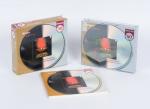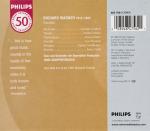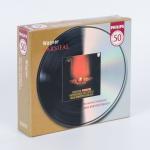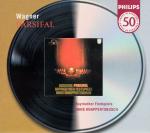Wagner, Parsifal - Bayreuther Festspiele - Hans Knappertsbusch - 4-CD-Boxset. CD
Parsifal – Bayreuther Festspiele – Hans Knappertsbusch – 4-CD-Boxset. CD 1: 1.Aufzug – Act 1 (Beginning) / CD 2: 1.Aufzug – Act 1 (Conclusion) / 2.Aufzug – Act II (Beginning)/ CD 3: 2.Aufzug – Act II (Conclusion) / 3.Aufzug – Act III (Beginning) / CD 4: 3.Aufzug – Act III (Conclusion). Chor und Orchester der Bayreuther Festspiele unter der Direktion von Hans Knappertsbusch.
Philips / Decca, 2001. CD Size. 4 CD’s. Original Hardcover Cardboard-Box. This rare set of 4 CD’s is in excellent condition.
Wilhelm Richard Wagner (22 May 1813 – 13 February 1883) was a German composer, theatre director, polemicist, and conductor who is chiefly known for his operas (or, as some of his mature works were later known, “music dramas”). Unlike most opera composers, Wagner wrote both the libretto and the music for each of his stage works. Initially establishing his reputation as a composer of works in the romantic vein of Carl Maria von Weber and Giacomo Meyerbeer, Wagner revolutionised opera through his concept of the Gesamtkunstwerk (″total work of art”), by which he sought to synthesise the poetic, visual, musical and dramatic arts, with music subsidiary to drama. He described this vision in a series of essays published between 1849 and 1852. Wagner realised these ideas most fully in the first half of the four-opera cycle Der Ring des Nibelungen (The Ring of the Nibelung).
His compositions, particularly those of his later period, are notable for their complex textures, rich harmonies and orchestration, and the elaborate use of leitmotifs—musical phrases associated with individual characters, places, ideas, or plot elements. His advances in musical language, such as extreme chromaticism and quickly shifting tonal centres, greatly influenced the development of classical music. His Tristan und Isolde is sometimes described as marking the start of modern music.
Wagner had his own opera house built, the Bayreuth Festspielhaus, which embodied many novel design features. The Ring and Parsifal were premiered here and his most important stage works continue to be performed at the annual Bayreuth Festival, run by his descendants. His thoughts on the relative contributions of music and drama in opera were to change again, and he reintroduced some traditional forms into his last few stage works, including Die Meistersinger von Nürnberg (The Mastersingers of Nuremberg).
Until his final years, Wagner’s life was characterised by political exile, turbulent love affairs, poverty and repeated flight from his creditors. His controversial writings on music, drama and politics have attracted extensive comment – particularly, since the late 20th century, where they express antisemitic sentiments. The effect of his ideas can be traced in many of the arts throughout the 20th century; his influence spread beyond composition into conducting, philosophy, literature, the visual arts and theatre. (Wikipedia)
Parsifal (WWV 111) is an opera in three acts by German composer Richard Wagner. It is loosely based on Parzival by Wolfram von Eschenbach, a 13th-century epic poem of the Arthurian knight Parzival (Percival) and his quest for the Holy Grail (12th century).
Wagner conceived the work in April 1857, but did not finish it until 25 years later. It was his last completed opera, and in composing it he took advantage of the particular acoustics of his Bayreuth Festspielhaus. Parsifal was first produced at the second Bayreuth Festival in 1882. The Bayreuth Festival maintained a monopoly on Parsifal productions until 1903, when the opera was performed at the Metropolitan Opera in New York.
Wagner described Parsifal not as an opera, but as “Ein Bühnenweihfestspiel” (″A Festival Play for the Consecration of the Stage”). At Bayreuth a tradition has arisen that audiences do not applaud at the end of the first act.
Wagner’s spelling of Parsifal instead of the Parzival he had used up to 1877 is informed by one of the theories about the name Percival, according to which it is of Persian origin, Parsi (or Parseh) Fal meaning “pure (or poor) fool”. (Wikipedia)
- Keywords: 19th century Classical Music · Audio CD (Classical Music) · Audio-CD · Bayreuth · Bühnenweihfestspiel · Catalogue Eleven – Music · Classical Music · Classical Music CD · George Hitching – Classics CD-Collection · George Hitching – Music Collection · Music – Rare · Opera · Parsifal · Parzival · Wagner, Richard
- Language: English
- ISBN: 028946475621
- Inventory Number: 29878AB
EUR 58,--
© 2026 Inanna Rare Books Ltd. | Powered by HESCOM-Software














